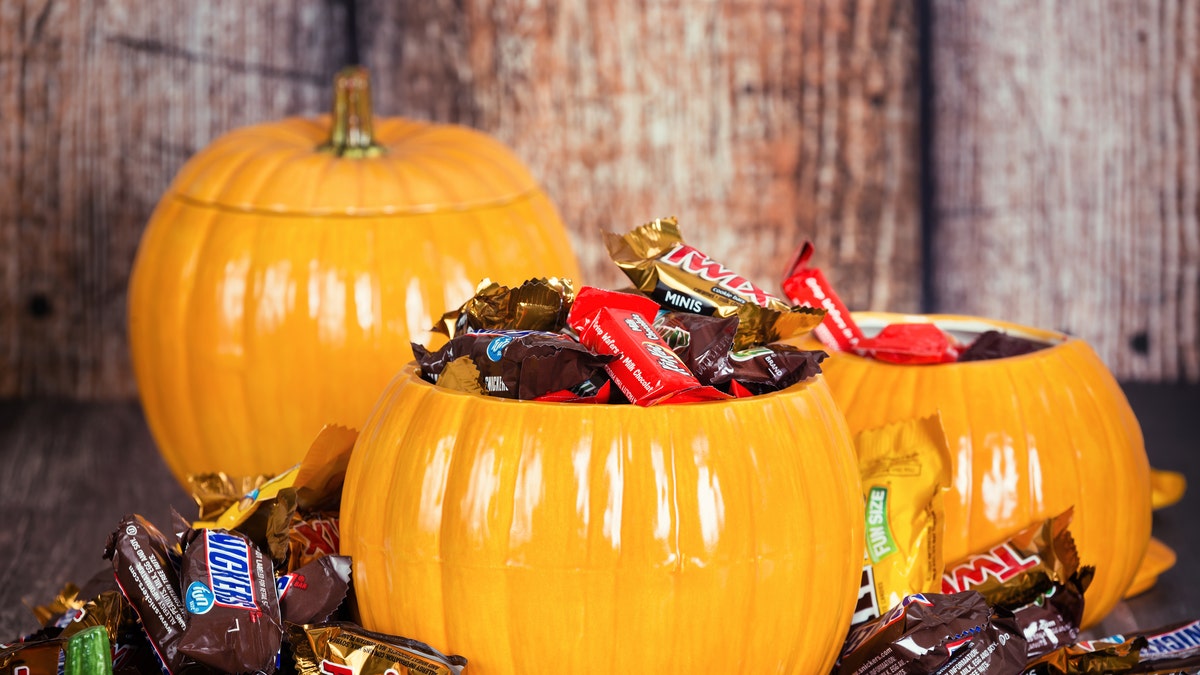
Dallas, United States - October 31, 2015: Decorative pumpkins filled with assorted Halloween chocolate candy made by Mars, Incorporated and the Hershey Company. (iStock)
People who mindfully consume their chocolate treats this Halloween may experience more of a mood boost than those who do so without thinking, or who mindfully consume other foods, a new study suggests.
"Mindful eating practices encourage people to slow down and think about their eating experience," said lead author Brian P. Meier of Gettysburg College in Pennsylvania. "My guess is that most people do not do that routinely."
Meier and colleagues studied a group of mostly white college students who ate either five pieces of Blommers Appalachian Gold Milk Chocolate Discs or five Carr's Plain Table Water crackers, each about a 75 calorie portion.
The students were randomly divided into four groups. One group was given some chocolate and instructed to eat it mindfully, another group was assigned to do the same, but with the crackers instead of the chocolate, a third group was told just to eat chocolate (without instructions about mindfulness), and the fourth group was assigned to nonmindful cracker consumption.
They ate while listening to 4.5 minute audio recordings, either including instructions on eating mindfully, or without specific instructions.
The mindfulness recording included instructions like "hold a chocolate/ cracker in your hand and gaze at the color and appearance and to think about the farmers who produced the ingredients needed to create the food," and "focus on the sensations created by the food."
The students also completed mood questionnaires before and after food consumption.
Those in mindful chocolate or cracker groups had more positive mood after eating than they had before eating, and people who ate chocolate had more improvement in mood than those who ate crackers.
"We only used milk chocolate and one amount (75 calories) in our study," Meier told Reuters Health by email. "We do not know if mindfully eating dark chocolate or a higher amount of milk chocolate changes the effect. Dark chocolate has more of the beneficial ingredients for physical health according to several studies, but we did not examine it here in terms of mood."
People who liked the food they were eating seemed to get more of a mood boost, so liking the food may explain at least part of the connection, the authors write in the journal Appetite.
Specific components of chocolate as well as associations with past positive experiences may influence mood, Meier said.
The study doesn't necessarily endorse chocolate intake, said Carlene Wilson of Flinders University in Adelaide, Australia, who was not part of the new study.
"The mood benefits are likely to be short term and impacted by amount consumed so that consumption of larger amounts would lead to excessive energy intake and associated guilt," Wilson told Reuters Health by email. "Excess energy intake is linked to the occurrence of obesity, which is a risk factor for virtually all chronic diseases."
"The study by Meier et al. does not suggest that people should eat more chocolate, per say, but that if they tend to enjoy chocolate normally, establishing mindfulness will increase the pleasure of eating it," said Robert J. Goodman of Northern Arizona University in Flagstaff, who was also not part of the new study.
Mindfulness promotes healthier consumption habits by maximizing the enjoyment people receive from their food, Goodman told Reuters Health by email.
"I'm sure most health experts would suggest to eat candy in moderation and aim for a balanced diet," Meier said. "Our data suggest that people should slow down and savor their Halloween candy because it might allow them to be a bit happier afterwards although we recognize that it may be hard to get children to do so."








































